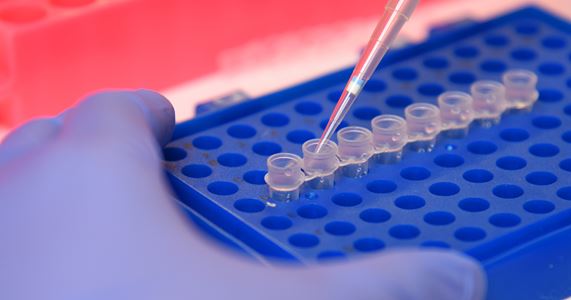INDIANAPOLIS— A breast cancer researcher at the Indiana University Melvin and Bren Simon Comprehensive Cancer Center received a five-year, $2.2 million grant from the National Cancer Institute to examine how certain immune cells support metastatic breast cancer development—and how to stop it.
Cells called macrophages usually perform essential tasks as part of the immune system, but breast cancer cells can hijack them to protect cancer cells and help them grow. When this happens, they become tumor-associated macrophages (TAMs).
“Our goal is to interrupt that communication process between those two cell types – the tumor cells and the macrophages – and in that way, prevent metastasis from happening,” said Liz Yeh, PhD, associate professor of pharmacology and toxicology at IU School of Medicine and a researcher at the Vera Bradley Foundation Center for Breast Cancer Research at the IU Simon Comprehensive Cancer Center.
 Tumor-associated macrophages are abundant in breast cancer tumors and promote metastasis, or the spread of cancer. Yeh’s research lab is interested in understanding more about these TAMS and exactly how they interact with the tumor cells. One strategy to target that interaction is through a protein kinase called HUNK.
Tumor-associated macrophages are abundant in breast cancer tumors and promote metastasis, or the spread of cancer. Yeh’s research lab is interested in understanding more about these TAMS and exactly how they interact with the tumor cells. One strategy to target that interaction is through a protein kinase called HUNK.
“We found that the presence of this kinase HUNK in breast cancer cells leads to communication with tumor-associated macrophages to promote this metastatic process,” Yeh said. “Kinases are a popular drug target because you can very specifically target their enzymatic activity.”
Yeh’s research will look at ways to directly target HUNK instead of targeting the TAM cells. Yeh hopes her research team can break the communication cycle between the tumor cells and the TAMS to re-establish anti-tumor immunity. These findings have the potential to identify new methods for treating metastasis.
Yeh’s research lab is also working on a drug discovery project to identify inhibitors (a molecule that binds to an enzyme to block its activity) for HUNK. The lab has long focused on understanding the role of HUNK in aggressive types of breast cancer, including triple negative and HER2-positive breast cancers.
About the IU Simon Comprehensive Cancer Center
The Indiana University Melvin and Bren Simon Comprehensive Cancer Center is the state’s only National Cancer Institute-designated Comprehensive Cancer Center and one of only 54 in the nation. The prestigious comprehensive designation recognizes the center’s excellence in basic, clinical, and population research, outstanding educational activities, and effective community outreach program across the state. It is also one of only 33 members of the National Comprehensive Cancer Network. As a member, the center’s physicians have a role in determining the recognized standard of clinical care for cancer patients. The center is the central hub for cancer research and education across Indiana University.
About IU School of Medicine
IU School of Medicine is the largest medical school in the U.S. and is annually ranked among the top medical schools in the nation by U.S. News & World Report. The school offers high-quality medical education, access to leading medical research and rich campus life in nine Indiana cities, including rural and urban locations consistently recognized for livability.




